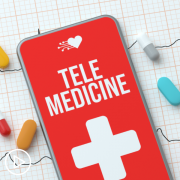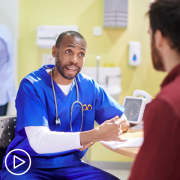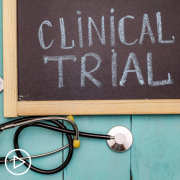Thriving Not Just Surviving: A Breast Cancer Expert’s Perspective
Thriving Not Just Surviving: A Breast Cancer Expert’s Perspective from Patient Empowerment Network on Vimeo.
How can breast cancer patients not just survive but thrive? Expert Dr. Bhuvaneswari Ramaswamy shares actionable patient advice to strive toward optimal health while living with breast cancer.
Dr. Bhuvaneswari Ramaswamy is the Section Chief of Breast Medical Oncology and the Director of the Medical Oncology Fellowship Program in Breast Cancer at The Ohio State College of Medicine. Learn more about this expert here.
See More from Thrive Breast Cancer
Related Resources:

|
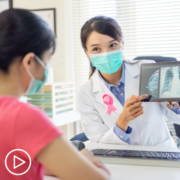
|
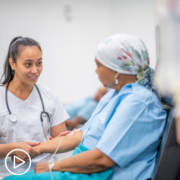
|
Transcript:
Katherine:
We start all of our Thrive Series with the same question. In your experience, what does it mean to thrive with breast cancer?
Dr. Ramaswamy:
That’s a great question. I think it’s an important one because we always talk about surviving breast cancer, and that’s obviously the most important thing. We all want to survive, but we all also want more than that. We don’t want to just live, we want quality of life.
And I think one thing that to remember is as soon as the breast cancer diagnosis is done, it’s in part – it’s difficult to say that you can thrive immediately. So, your focus is on really getting through the treatments and making sure it’s all done. So, at that time, managing the toxicities and getting through the stresses of going through the treatments and surgery, radiation, et cetera takes over everything else. But as you finish that off you, you want to focus on what are the ways you can try to get back to the life that you had prior to breast cancer.
Now it’s difficult and it’s almost impossible to forget the big C word in your life. So, that’s going to hang and that’s going to kind of make anything you look at your perspective as slightly different. I mean, every pain could be worrisome because could it be a reference? Has the cancer spread? Or every bad news about another person could you, could transport that about yourself and then kind of worry about what could happen to you.
Every visit to the doctor, and particularly your oncologist, is going to bring back memories. So, there are certain things that you can’t take away, but time can heal those. But what we talk about thriving is that you looking at factors that is going to make you and your body healthy. That is going to be exercise, being engaged in whether your work or your family work and being joyful and seek what brings you joy, whether it’s friends, your work or your family.
And make sure you make time for that. And also eating right and diet is an important aspect of that. Not doing inflammatory diets such as highly fatty diets or meat-containing diet, but really kind of looking at your diet and your weight and your exercise. And trying to also discuss with your team about what are the symptoms you are having and how we can support you to mitigate those symptoms. And really having conversations and somebody you can confide with to both manage your physical aspects as well as the emotional aspects.
And really kind of thriving and becoming an advocate for yourself as well as for others who have breast cancer is what I would say is truly thriving with breast – with the diagnosis of breast cancer.

